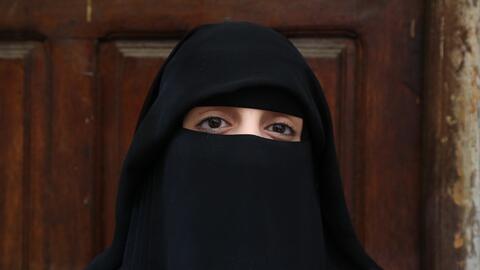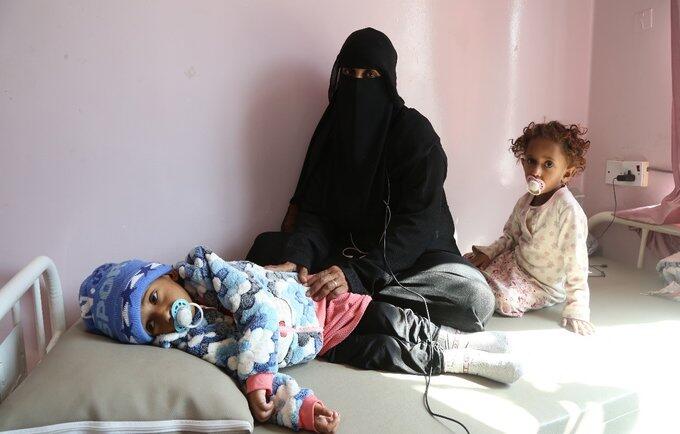Sana’a, Yemen – Four years into the conflict in Yemen, some 22.2 million people need immediate humanitarian assistance, and two thirds of the population do not know when their next meal will come. As fighting and airstrikes thrust millions to the brink of starvation, Yemen’s looming famine threatens to become the worst in recent world history.
Mothers in the midst of famine
Umm Mohamed, a 28 year-old mother of three who lost her husband during the war is one of scores of Yemeni mothers who are forced to watch as their children go hungry.

Women and girls are bearing the heaviest burden. ©UNFPA-Yemen
“I took two of my children out of school because there was no money. I couldn’t pay the rent, so, the landlord kicked us out. Now I live with the neighbors. Some days, I can’t provide food, so we end up eating only one meal,” Um Mohamed said.
Yemen is currently the worst humanitarian crisis in the world. Women and girls are bearing the heaviest burden as the conflict exacerbates their vulnerability including by jeopardizing their reproductive health and rights. The lives of an estimated 2 million pregnant and lactating women will be at risk if famine strikes in Yemen. Some 1.1 million are already acutely malnourished, heightening the chance of miscarriage and stillbirth.
Kefaya, a 40 year-old mother of six fled Al Hodeida with her family and settled in Sana’a. Her sixth child was born underweight because of her malnourishment during pregnancy.
“Four of my children left school because we could no longer afford it,” she said, “Now, with the blockade, our lives have become worse. Some days, we only have one meal. Other times, we only have bread and water.”
Amna, 30, suffered severe malnutrition during her pregnancy. The deteriorating economic situation also meant she couldn’t afford the vitamins and medications her pregnancy needed.
“When I gave birth to my second child, he was deformed and died instantly,” Amna said.
Cut off from medical care
Over half of maternal deaths – one woman every two minutes – occur in countries affected by humanitarian crisis or fragility. Even before the war, Yemen already had one of the highest mortality ratios in the region. Now, with the threat of famine, the economic deterioration and a collapsing medical sector, the number of pregnancy and childbirth-related deaths is likely to have doubled.
“I waited for my first pregnancy for eight years. But when the time came, I could not go to the hospital because we could not afford it,” 24 year-old Latifa, married at age 16, told UNFPA, “My mother went to get our neighbor, a midwife. They were late, and the child died inside me. He was born blue, dead.”
Nearly half of all health facilities in Yemen are no longer operating, cutting pregnant women off from emergency obstetric care. Even women who live within distance to a working medical facility often cannot afford its maternal health services. Fear of being targeted also plays a role in women’s inability to access emergency services when needed. Last August, Al Hodeida’s biggest hospital and a major antenatal center, Al Thawra Hospital, was brutally attacked.
Maleka was pregnant when violence descended on her home in Taizz, but she – like many women in her position – has steered clear of the closest hospital.
“We are afraid that it might be targeted,” she told UNFPA.
Instead, Maleka turned to a UNFPA-supported midwife for antenatal care.
“The midwife looks after me on a weekly basis,” she said. “If I cannot go to her, she comes to my house to check on me and follow my pregnancy. She provides full care and gives us everything for free, including medical tests and medicines.”
Many of these deaths are preventable. As health systems collapse and medical costs skyrocket, midwives play an essential role filling the gaps. According to UN data, an estimated two thirds of maternal and newborn deaths worldwide could be averted by well-trained midwives.
On the ground
UNFPA has trained some 7,500 midwives in Yemen. With the support of partners, UNFPA remains on the ground, working now to support 2,500 unemployed midwives and establish community clinics for maternal and newborn health services. To date, a total of 120 community clinics have been opened in the hardest-hit areas, including 40 this year.
Since the start of 2018, UNFPA's response in Yemen has reached more than half a million people, including over 150,000 women and girls receiving protection services – such as health care, legal support, livelihood-skills development and cash assistance – and 250,000 reached with reproductive health services. UNFPA is also supporting 206 health facilities to provide care for pregnant and lactating women.
As the crisis continues, so much work is still needed to ensure the safety and good health of 3 million Yemeni women and girls in reproductive age, and to advocate for the inclusion of their specific needs as a priority of humanitarian action in Yemen.




